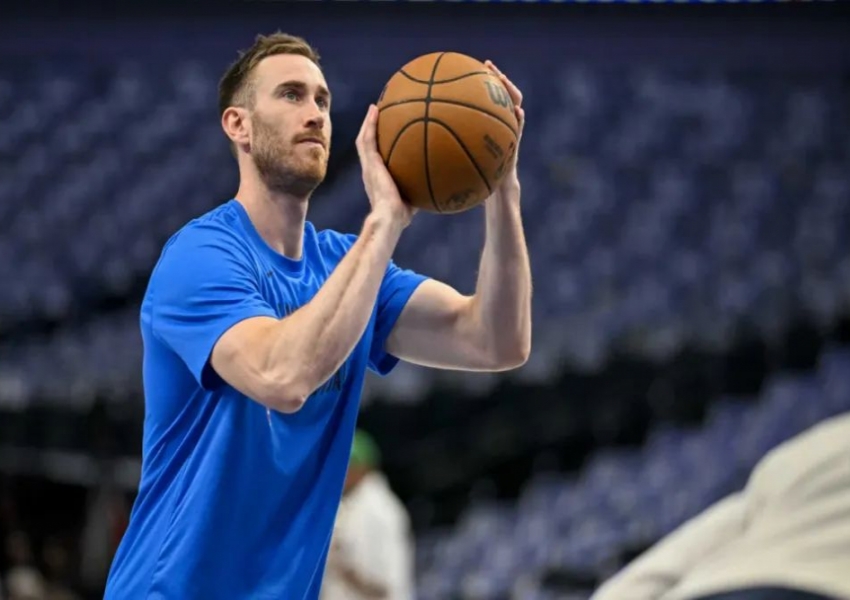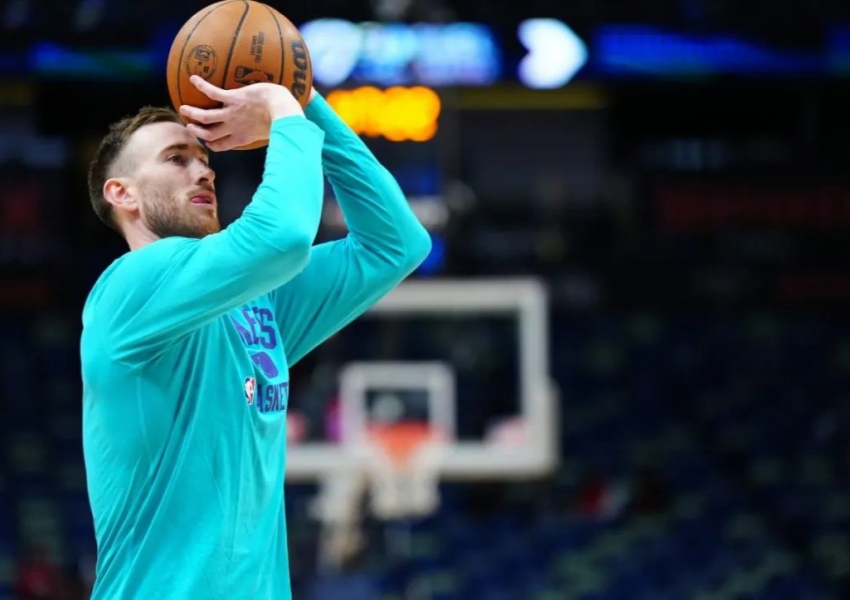Sudden Retirement! At 34, Gordon Hayward Prioritizes Life Over Basketball
In a surprising turn of events, Gordon Hayward announced his retirement from professional basketball on the evening of August 1st. Hayward, at just 34 years old, shared a heartfelt message on his social media, marking the end of his 14-year NBA career. In his announcement, Hayward expressed his desire to spend more time with his family and looked forward to new challenges and adventures off the court. "I want to spend more time as a father and husband," Hayward wrote. "I am very excited about the next chapter of my life, and I can't wait to see what the future holds."

This unexpected news has left many fans and analysts in shock. Despite his age, Hayward was still a productive player. Last season with the Charlotte Hornets, he averaged 14.5 points, 4.7 rebounds, and 4.6 assists in 31.9 minutes per game, with shooting percentages of 46.8% from the field, 36.1% from three-point range, and 76.5% from the free-throw line.

The Trade to Oklahoma City Thunder: A Turning Point
Hayward's retirement can be partly attributed to his mid-season trade to the Oklahoma City Thunder, which had a significant impact on his performance. Prior to the trade deadline, the Thunder acquired Hayward from the Hornets in exchange for Tre Mann, Davis Bertans, Vasilije Micić, and two second-round picks. The move was intended to bolster the Thunder's lineup with an experienced, versatile forward. However, the results were far from satisfactory.

In his 26 games with the Thunder, Hayward's playing time dropped to 17.2 minutes per game, and his production plummeted to 5.3 points, 2.5 rebounds, and 1.6 assists, with shooting splits of 45.3% from the field, 51.7% from three, and 69.2% from the line. His performance in the playoffs was even more dismal; he appeared in only seven games, averaging 6.6 minutes, and failed to score, missing all three of his field goal attempts.
The stark contrast in his role and performance between the Hornets and the Thunder underscores the significant impact the trade had on Hayward. With Charlotte, he was a key player, nearly averaging 15 points, 5 rebounds, and 5 assists per game. In Oklahoma City, he transitioned from a starter to a bench player, with his minutes and production slashed dramatically, effectively becoming a non-factor in the playoffs.
Hayward's Struggles in Oklahoma City
Was the Thunder at fault? To some extent, yes. But a larger part of the issue seems to stem from Hayward's own decline. During his stint with the Thunder, Hayward played conservatively, often passing up open shots. It appeared as though his individual performance had deteriorated significantly. While he could still put up numbers on a weaker team, he struggled to keep pace with a more competitive squad.
Two notable incidents highlight the difficulties of his time in Oklahoma City. Firstly, according to Hayward's wife, Hayward had warned Thunder General Manager Sam Presti that the trade was not a good fit even before it was finalized. Despite this, the Thunder proceeded with the trade. Secondly, after the season, Presti publicly admitted that trading for Hayward was a mistake, which led to a public rebuke from Hayward's wife on social media. The relationship between Hayward and the Thunder ended on a sour note.
Why Retire Now?
Given these circumstances, why did Hayward decide to retire? One reason is the lack of interest from other teams. Despite a solid season with the Hornets, Hayward remained unsigned a month into free agency. Rebuilding teams likely did not see value in adding a veteran, while contending teams were wary of his diminished performance with the Thunder. Additionally, new league regulations have made teams more cautious in signing players, and Hayward's prospects of finding a new contract before the season started seemed bleak.
Another reason, as Hayward mentioned in his retirement letter, was his desire to spend more time with his family. Throughout his career, Hayward has been known as a devoted husband and father. Financially, he is well set, having earned $273 million over his career, plus additional income from endorsements. With his financial security, Hayward can afford to prioritize his personal life over his professional career.
Reflecting on Hayward's Career
How should we evaluate Gordon Hayward's career? Selected as the ninth overall pick in the 2010 NBA Draft, Hayward did not accumulate a vast array of accolades, but he did achieve significant milestones. He was named an All-Star once and served as the leading player for the Utah Jazz, guiding them to the playoffs and earning a max contract in the process.
A pivotal moment in Hayward's career was the severe injury he sustained during his time with the Boston Celtics. Without that injury, Hayward might have achieved even greater success. However, it's fair to say that Hayward's level was always that of a fringe All-Star, and expecting him to perform at an MVP or All-NBA level was perhaps unrealistic.
One notable shortcoming in Hayward's career is that he never advanced to the Conference Finals. After leaving the Jazz, he did not make another All-Star appearance. At 34, an age where many players are still at their peak, Hayward chose to retire. His departure from the NBA, from earning $30 million a year to retiring, emphasizes the importance of life beyond basketball.
Hayward's career may be marked by what-ifs and potential unfulfilled due to injuries, but it also stands as a testament to his resilience and skill. His journey from being the face of the Jazz to overcoming a devastating injury with the Celtics, and finally contributing valuable minutes with the Hornets, reflects a player who gave his all to the game.
As Hayward steps away from the court, he leaves behind a legacy of professionalism, skill, and dedication. His decision to retire, influenced by his desire to be more present for his family, is a reminder that athletes are more than their on-court performances. They are individuals with personal lives, families, and aspirations beyond their sports careers.
Hayward's Legacy
While Hayward may not have achieved the ultimate heights in the NBA, his impact on the game and his teams was significant. He was a versatile forward, capable of scoring, playmaking, and defending, and his professionalism and work ethic were exemplary. As he transitions to the next chapter of his life, Hayward carries with him the lessons learned on the basketball court, ready to face new challenges and adventures.
In conclusion, Gordon Hayward's retirement at 34 may seem abrupt, but it is a decision rooted in personal priorities and a holistic view of life. His career, marked by highs and lows, injuries and comebacks, is a story of perseverance and dedication. As he bids farewell to basketball, we wish him all the best in his future endeavors, confident that he will continue to succeed in whatever he chooses to pursue.
Copyright Statement:
Author: focusnba
Source: FocusNBA
The copyright of this article belongs to the author. Reproduction is not allowed without permission.
Recommended Blog
- End of the Road! The Worst-Case Scenario Unfolds: What Happened to China's Women's Basketball Team?
- Victory for China! Women's Basketball Team Triumphs in Decisive Group Stage Finale
- End of the Road! The Worst-Case Scenario Unfolds: What Happened to China's Women's Basketball Team?
- Impressive Performance! Averaging 20+2+8! What Makes 1.72-meter Yuki Kawamura So Strong?
- 6-for-5 from Three! Yuki Kawamura’s Best Teammate! Another NBA-Caliber Player from Japan
- China Men's Basketball Announces 20-Man Training Squad! Is Lin Wei Being Blacklisted? The Nation's Top Shooting Guard Left Out...
- Trail Blazers Announce! Cui Yongxi Ready for the NBA Again! China's Top Forward Shows His Talent...
- Plus-Minus +30! 5 Steals and 2 Blocks! Leaving Jaylen Brown Behind Was the Right Call!
- Chinese Women's Basketball Team: Internal Strife? Li Yueru Takes Only 3 Shots in 25 Minutes! This Is the Top Core Center...
- NBA Update: Lauri Markkanen Makes Decision Regarding Warriors Trade! The Last Big Offseason Deal